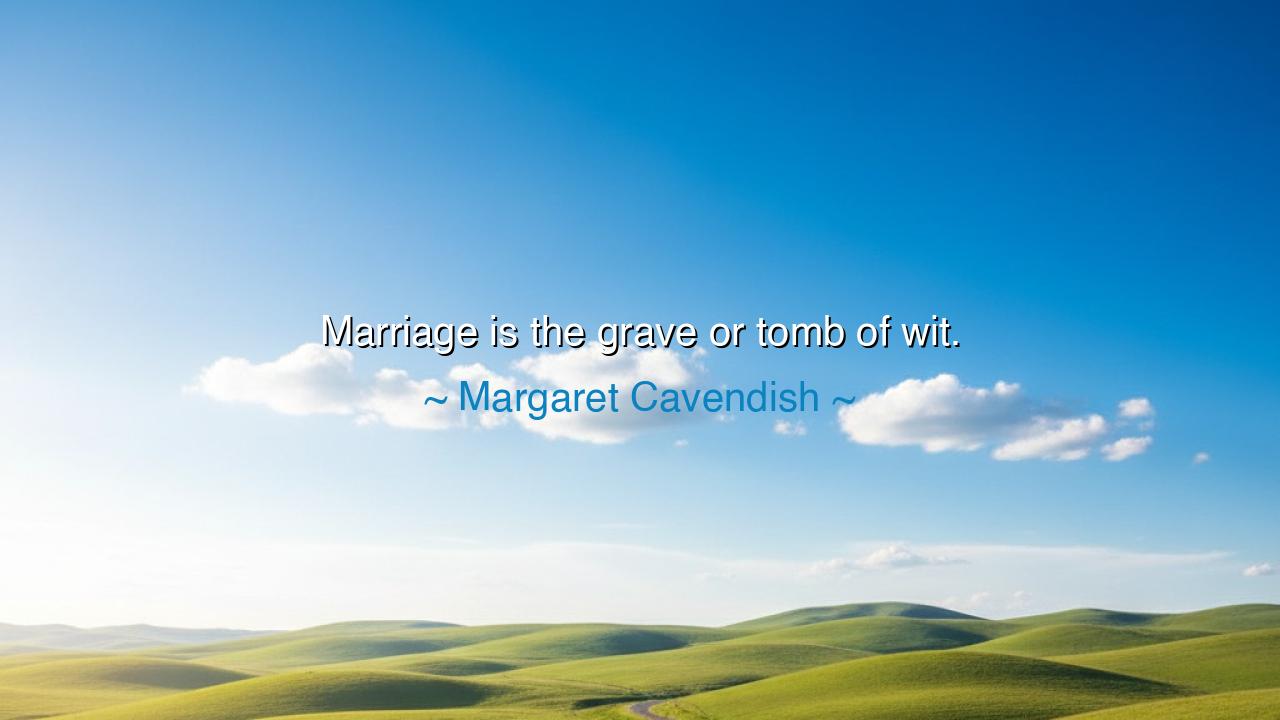
Marriage is the grave or tomb of wit.






Come closer, O children, and hear the words of Margaret Cavendish, a woman whose insights into the nature of marriage and its consequences are as timeless as they are profound. She once said, "Marriage is the grave or tomb of wit." These words, though spoken centuries ago, echo the sentiments of many who have known that the bond of marriage, while sacred and necessary, can sometimes lead to the stifling of one’s spirit, creativity, and intellectual fire. What, then, did she mean by saying that marriage is the grave of wit? Let us delve deeply into these words and uncover their deeper truths.
To speak of marriage as a grave is to recognize that, while it may begin with the bright flame of passion, over time, it can often weigh heavily on the individual. The dynamics of a marital relationship, with its burdens of responsibility, expectations, and compromises, can smother the exuberance of free thought and the spark of creativity. Cavendish speaks here not merely of the union of hearts, but of the often-overlooked restrictions that come with such a bond. The wit, or sharpness of mind, that once flourished freely can be buried under the duties and pressures that come with marriage. It becomes, in a sense, a grave—not because marriage is inherently bad, but because the freedom to be oneself, to think boldly and without constraint, can sometimes fade away.
Consider, O children, the life of Socrates, whose philosophy was built on questioning, debate, and self-examination. Socrates, the great philosopher, never married, and many believe his choice was influenced by the understanding that marriage could stifle his intellectual freedom. His ideas, his wit, were too vast and too untethered to be confined to the responsibilities of a conventional relationship. He chose the path of constant exploration, seeking knowledge and truth without the burden of an intimate partner who might pull him away from his intellectual pursuits. In this sense, Socrates exemplifies the kind of freedom that Cavendish might have believed was lost in marriage—the freedom to explore, to question, to think without boundaries.
Yet, O children, this is not to say that marriage itself is a curse. Marriage, as we know, is a union that can bring joy, companionship, and a sense of purpose. But Cavendish’s words invite us to reflect on the costs—the sacrifices made when two people unite. The time once spent in pursuit of personal ambitions, whether intellectual or creative, must now be shared, and often the mind becomes focused on family, responsibility, and the tasks of daily life. In the ancient story of Penelope and Odysseus, we see the tension between the intellect and the duties of marriage. Penelope, though fiercely intelligent and resourceful, spends years waiting for her husband’s return, her wit constrained by the long absence and the demands placed upon her. Her intellect, like that of many women of her time, had to adapt to the circumstances of marriage, subordinating her wit to the long, arduous wait for her husband.
Indeed, Cavendish’s words about wit being buried in marriage can be seen as a reflection on the gendered nature of intellectual and personal expression in her time. In her era, women were often relegated to the domestic sphere, where their potential for intellectual growth was limited by the expectations of marriage and motherhood. Women like Mary Wollstonecraft, a precursor to modern feminist thought, fought for the intellectual freedom of women, believing that true equality would allow women to thrive intellectually and creatively, without the restrictions that often accompanied their marriages. Cavendish’s remark, then, might not just be a comment on marriage, but on the societal structures that confined both men and women to roles that suffocated their creativity and intellectualism.
The lesson from Cavendish’s words is clear: while marriage is a bond of love and commitment, it can also be a burden that restricts personal growth, creativity, and intellectual freedom. Yet, this is not the inherent flaw of marriage, but rather the external pressures and societal expectations that shape it. We must understand that a healthy marriage should allow for the expression of both partners’ individuality—a space where both can grow, create, and thrive. Marriage, in its truest form, should not be the grave of wit, but the garden in which it is nurtured and allowed to flourish, alongside love and partnership.
Therefore, O children, let marriage not stifle your creative potential, nor should it burden you with the expectation of conformity. Instead, seek partnerships that encourage growth, that celebrate wit, intellect, and the freedom to pursue personal passions. In this, you will find not a grave or tomb, but a shared journey of mutual respect and unfettered growth. Let love and wisdom coexist, each nourishing the other, as you walk your path in this world.






AAdministratorAdministrator
Welcome, honored guests. Please leave a comment, we will respond soon